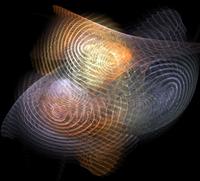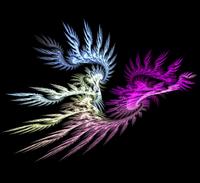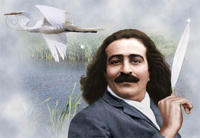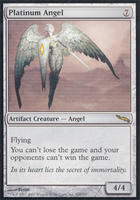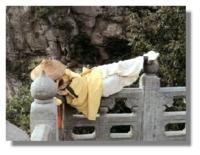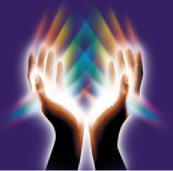
September 24, 2005
Cage
life, slipping away,
never knowing who I am
or why I am here
S. Nice haiku, Mark. Maybe at that very moment we die we'll know who we were and why we were here.
M. OMG... let's not wait that long, okay? Whew. We gotta know now. That's the game. That's the greatest obsession... to become aware. What a wonderful obsession. :-) !! To live in awareness. May that happen to you, very soon, in this lifetime. I hope you experience that.
S. I hope I do, too! It's a deep longing, Mark. Wow! I can't even tell you. :) I feel like I'm going out of my mind because of it, but I've heard that that is a common feeling in those who are starting out on their journey.
M. That's because it isn't centered in the mind, hence the expression and feeling. You have to center in a different spot.
S. How does one find that spot? Through meditation? Do you meditate often?
M. Well, I don't think I meditate all that traditionally. Sometimes I lay down to relax. That's not meditation. Sometimes I will focus on helping someone or think about solving a problem. I suppose that is a form of meditation, but also prayer. You know? It is inhaling and receiving (meditation), and exhaling and giving (prayer).
I often go into "the zone", the so-called mushin state, or empty mind... to receive direction. That definitely is a form of meditation. I am trying to be in that spot more and more. I don't live in it constantly.
Sensei once told me the best way to learn to meditate is to do so in everyday life. I took his advice. He wasn't debunking traditional mediation, he was simply saying, "Here is the best practice for meditation – application in everyday life."
S. I was taught "driving meditation" by a Buddhist monk. I can't say I've practiced it all that much because sometimes I get a little angry behind the wheel, mostly when someone gets on my tail. And I really dislike that I get like that, but I don't notice it until after it happens. That must show the real me - that I can actually get angered. I'm not supposed to be like that.
I kind of do like you - lay down to relax. I try to use it as a form of meditation but I always fall asleep. :D I'd like to practice more of the sitting in lotus position kind of meditation.
But Sensei sounds right. We can use our everyday life as a form of meditation.
M. Well, we are like that though (getting angry, etc.). Sensei states that we have to accept the reality that we live in world of right and wrong. No one is all right, and no one is all wrong. So each of us are right and wrong. No exceptions. Perfection in this world, he states, is learning to balance ourselves in a world of right and wrong. It takes some of the pressure off ;-)
S. That makes me feel a little better. I guess we can't be perfect after all, no matter how hard we try. Sensei is a man of wisdom. So are you. :)
M. That whole perfection thing is a huge crock of ***t. It is (imo) one of the greatest misconceptions ever put on people. In Christianity, they serve up Jesus as perfect. He committed zero sin. He never did wrong.
That is such a huge pile of s***. To say he never did wrong or to say he was perfect is to build a model that is unattainable. And it lets the priests, ministers, and teachers off the hook for not being able to give their followers the teachings that bring people to the actual inner experience that we are all craving. They can't do it! So much for their standard of perfection.
Jesus was an imperfect being. It is so simple to see: He breathed polluted air, and ate food that wasn't 100% pure. He had bowel movements and pissed... showing that he had waste. He was imperfect. Yet, he carved the Way and a Path in spite of his burdens and imperfections. That’s "the good news" to me!
It is impossible for God, God's only Son, or the greatest of all Teachers to be perfect. Imperfection is part of the universe, part of God's creation. If God is in all things (which he is), and at the center of all things, than he is certainly in the center of imperfection.
This is a subject that really upsets me and gets me going, because we all live under these impossible expectations of perfection. Such expectations put the experience out of our reach. And that’s wrong! It’s a sin!
S. I've read some passages from The Gospel of Thomas, and one of those passages tells of Jesus killing a boy? Funny how the Gospel of Thomas didn't make it into the canon.
I'm not intolerant of the Christian faith, but one thing I disagree with is that Jesus was God's only son. If there is a God, then we are *all* God's children.
M. It says, "God's only begotten Son".
S. But what if we look at it from a different perspective? In the view that we are all part of God? Then we are all begotten by God. If my mother and father have part of God in them, when they conceived me, I am therefore part of God and hence begotten by God.
M. Oh yes, I completely agree. And having a firstborn doesn't negate the existence of other children. But the first Soul, the Prime Creator, the Master Soul came out of the emptiness, and had awareness.
I actually remember being born as a soul. I recall the experience of coming into awareness. But there was someone looking into my eyes when I first opened them. The firstborn, the Master Soul, didn't have anyone looking into his/her eyes.
With respect to Buddha, who's to say that wasn't an incarnation of 'the only begotten Son'? Awareness is not the domain of only that Soul. Awareness is the 'objective' of that soul... to spread it, to help others experience and realize it.
S. I see what you're saying now. Buddha and Jesus could both have been incarnates of the same soul. But if we all originate from the same source, we are all part of that same soul. It's just that we're all trying to realize it. That brings us back to we're all God's children. We are God, therefore we are the parents, therefore we are the children. We are the seed and the tree and the ground from which the tree grows. (I had an anonymous visitor who started me thinking about seeds and trees.)
M. Yes.
There is a formlessness that is the highest "God"; and that out of that void emerged awareness. And once awareness came into Being, that awareness became the first Soul, the elder brother, the Creator of form and of all things... who is very aware that he came out of the formless, that there is a precursor to him, an energy that powers all things. But I know that I am not that Soul; I know that I came from that Soul. That Soul, that Being, is senior to me.
The expression "my Father in heaven" means several things to me. First, it is my Higher Self, the self that I am when I am in dream state, or when I die and go back to the other side; the self that is powering up this body called Mark. But my highest Father in heaven is my spiritual birth Father, my creator. But I could have a higher Father than that if my creator is not the highest of the highest. Follow?
S. Yes, I follow. It sounds kind of like a dualist view.
My question, is what is the highest of the highest? Where did it all begin? These are some of the greatest philosophical questions ever asked.
M. I am not qualified to answer these two questions. Yes, it is a dualist view. It is also a view of being One, that we are all One. Both are true. And, it is in between both. Centered. It's all about the center.
S. I'd like to be Awake and Aware like you. Eternally Aware.
M. I hope you can be better at it than me. :-)
S. I don't think that will ever happen!
M. Be careful what you wish for. :-)
In my opinion you have the ability to realize far more, in this lifetime, than you are giving yourself credit for. Why not give yourself some credit?
Don't you already have an inner 'knowing' or sense of the truth of this?
S. I feel like I have a knowing, but I haven't truly experienced it. Aren't I supposed to feel or see something? I guess I'm expecting to see lights or images when I close my eyes at night. Perhaps it's my expectations getting in the way.
M. Awareness and center lie in the direction of that feeling, that knowing. That's the direction.
Here is some advice I have received about this:
1. Relax
2. Stop thinking so much
3. Don't expect; just let whatever happens, happen
(This advice is very good, and truly works.)
But the thing is (here is my broken record running at full speed)... you have to have a teacher for the deeper experiences. They are the guide that says, "yes, that's the way" or "no, come back over this way", or "why are you getting so upset?" And so on. Are you despairing or hopeful?
S. Thanks for the steps. I am going to try to put them into use. I just have to remember them instead of being lazy and doing what seems to come natural, and unfortunately it's laziness that seems to come natural for me. And by laziness I mean that I might not relax right away, and I might be tempted to keep on thinking and expecting. But if only I can remember these steps I might be headed in the right direction.
Oh, to answer your question: I'm very hopeful.
M. Another recommendation is:
4. Don't put so much pressure on your self.
It's just a matter of repetitions. Just practice and chip away at it.
I don't want to make it sound like if you do these four things, that's the way to go about it. No, they are just mental/emotional attributes. Principles are the key.
S. It's just like with dream recall: Practice and sooner or later it will come natural to you.
Were you ever despairing? I have to tell you that I was despairing before... maybe a few months ago. But all that's changed now. I am hopeful and emotionally I don't think I could be any healthier.
M. Yes, I have been deeply despairing. And it still happens at times. Especially when I look at where I am, compared to what I am out to do; or when I look at what I’ve done. As Sensei says, it is only the hardest, most difficult thing in the world that you are wanting to do. There is nothing harder.
S. I think that despair might cause the hopefulness, which in turn drives us. It's just like what you said about having to be good and bad. It's part of the balance of things.
M. Yes it is. To be successful in overcoming despair, I reach for hopefulness. Hopefulness brings higher values into focus. Once I can see a higher value, I can start to transcend and overcome despair.
S. Like Yin and Yang. I think Hopefulness is like Yang. Despair is the Yin. You can't have one without the other. At first there is despair, then hopefulness. And with hopefulness comes expectations, and when those expectations aren't met, despair introduces itself again. But hopefulness always comes back. It's like a sine wave.
M. Exactly. Perfectly stated.
The spot you are looking for is in between the yin and yang, between hopefulness and despair, between right and wrong. That spot is the center.
S. Ah... I see now. :) So that's what you meant by being "centered". I like it when everything becomes clear. :)
M. It’s a great feeling. So how does the term 'centered' take on a new meaning for you?
S. I'm not going to look too far to the left or too far to the right. I won't despair too much or hope for too much, and the same goes with expectations. I will be more relaxed in my approach. I won't think too much on things but I'll think just enough.
M. Yes, and sometimes I will have to think a lot about things, and there will be times where I will have to go all the way to the left, or all the way to the right. Sometimes I will need a lot of hope or even a ton of despair, but in all that I do I will strive to do what is balanced and centered for the situation and for me. And I will strive to be balanced and centered within my self.
S. That sounds better than what I said. In order to have balance you have to have equal weight on both sides. :)
M. Sometimes. Sometimes I have to lean to one side to catch my balance. Sometimes I have to move way over to the left so a car won't hit me. Everything is relative to the center and being balanced, and everything has a center no matter where you are in the relative sense.
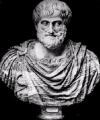 Aristotle believed everything that existed had a purpose. For instance, a knife exists to cut things; an apple exists to be eaten; a cat exists to offer human companionship (or to kill mice).
Aristotle believed everything that existed had a purpose. For instance, a knife exists to cut things; an apple exists to be eaten; a cat exists to offer human companionship (or to kill mice). Yesterday, a group of six co-workers and myself went to lunch. They started talking about someone. I joined-in. The kindest things weren't quite said. Why am I still participating in such behavior? Haven't I developed enough spiritually to not give in to such temptations? Just when I thought I loved everyone, here I am doing wrong, talking about someone behind their back. I feel guilty.
Yesterday, a group of six co-workers and myself went to lunch. They started talking about someone. I joined-in. The kindest things weren't quite said. Why am I still participating in such behavior? Haven't I developed enough spiritually to not give in to such temptations? Just when I thought I loved everyone, here I am doing wrong, talking about someone behind their back. I feel guilty.



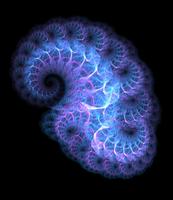




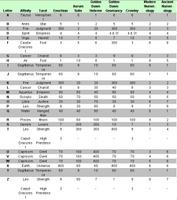
 September 24, 2005
September 24, 2005

 Tonight's dreams weren't very, um, enlightening. However, since I like to keep track of all my dreams I'm putting them here.
Tonight's dreams weren't very, um, enlightening. However, since I like to keep track of all my dreams I'm putting them here. My friend from India, Vino, is writing a book on dreams. He is seeking information on the concept known as "dream-sharing", where two people meet in dreams, either lucid or otherwise. If anyone has any information on this phenomenon or has actually experienced it, please get back to me so I can pass the information on to him.
My friend from India, Vino, is writing a book on dreams. He is seeking information on the concept known as "dream-sharing", where two people meet in dreams, either lucid or otherwise. If anyone has any information on this phenomenon or has actually experienced it, please get back to me so I can pass the information on to him.



 I said "wow" last night after closing a book I've been reading. I haven't said "wow" to a book in ages. I had almost forgotten how it felt.
I said "wow" last night after closing a book I've been reading. I haven't said "wow" to a book in ages. I had almost forgotten how it felt.

 I'm still at the beginning of _Sophie's World_, mainly because I spend so little time reading. Perhaps I should blog less and do more reading? Anyway, while reading this book I feel as though I am looking at things again through the curious eyes of a young girl. It is such a rejuvinating experience to be reading this book! I've always enjoyed learning, but Mr. Gaarder takes an educational subject and makes it fun to explore. He makes me think. Ah! How I've missed really thinking!
I'm still at the beginning of _Sophie's World_, mainly because I spend so little time reading. Perhaps I should blog less and do more reading? Anyway, while reading this book I feel as though I am looking at things again through the curious eyes of a young girl. It is such a rejuvinating experience to be reading this book! I've always enjoyed learning, but Mr. Gaarder takes an educational subject and makes it fun to explore. He makes me think. Ah! How I've missed really thinking! Dream fragment 1:
Dream fragment 1:

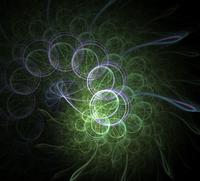

 (I had this dream while taking a nap today.)
(I had this dream while taking a nap today.)


